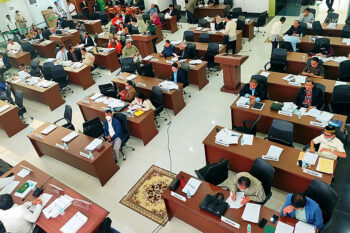DAVAO CITY (MindaNews/ 24 September)—I am watching with great interest — and amusement –the on-going new “telenovela” now gripping the nation. No, not the popular “Walang Hanggan” nightly episode on TV. But the real life caper on the China issue starring Senator Antonio Trillanes IV. It reminds me of my own work in Malacanang. I had my own share of “back channeling” problems. I have a few thoughts to share, if I may.
BACK ROOM
“Back channeling” is a complex game. It can be dangerous. It has to be properly managed to accomplish the desired results. Or it can blow up on our faces. And backfire.
It simply means sending someone to do “back room work,” outside the usual public glare and “below the radar screen,” who quietly and discreetly and “behind the scene” engages another party. Usually he has goodwill with the other side and credible enough. Meaning he has the direct mandate and access to the “principal” or in the case of Malacanang, of the President no less. Of course, it is usually the practice that if the back channeler does not succeed, he merely disappears into the sunset and protects his principal from any negative fallout of a failed mission. This allows a certain level of deniability to protect the Presidency.
“PRINCIPAL”
Malacanang resorting to back channel work is normal — in foreign diplomacy, politics, negotiations and in almost all levels of statecraft, local or foreign. But it is not a simple task. If it involves the Presidency, and the President as the “principal,” it is all the more complicated and requires astute handling. It is not a work for the amateurs. The principal must be discerning and careful to balance things considering the sensitivity of the task. He must have a direct handle of the mission and gets all the players together periodically for updating so that everyone is on the same page and speaks with one voice and the mission properly executed, each one playing his respective role. The “principal” can also “compartmentalize” the mission, meaning letting the players know things on a “need to know” basis. That means the “actors” must understand the roles they have to play and if they feel they cannot accept honorably some protocols, they can quietly take leave and go (resign) to allow the mission to be accomplished in the end. In short, the principal must be a virtuoso conducting the orchestra. A discordant note will be his responsibility and he must address them personally. Especially matters of statecraft. If the principal is not capable of doing this properly, then back channeling will be counterproductive.
DANGERS
It is a sensitive undertaking. For example, the cabinet secretary concerned must be “kept in the loop” and must help manage the scenarios with the behind-the-scene person. If this is not done, the official will feel he is “short-circuited ” or sidelined and kept in the dark. Or it can be interpreted to mean that the “principal” does not totally trust the cabinet official to carry out the mission, hence another one is commissioned to do the job. When this happens, a variety of naughty and negative consequences can happen. For example, both Cabinet official and the “backroom worker” will try to outdo or outshine the other. Or that they work in cross purposes. Or worse, they undermine each other. Consequently, the issue blows up on their faces, and ultimately smears the principal. End result: mission not accomplished! And a lot of public recrimination and posturing ensue.
GOOD CHOICE
The choice of a backroom worker is crucial. He must be acceptable and must have a previous track record of earlier contacts like being friends and had previous access with the other side. You don’t send someone who will still first look around if he has friends there to connect. He must also be capable of doing a quiet, self-effacing mission and willing to take the heat or absorb the negative consequences. Not everyone who “volunteers” can qualify, however lofty the intentions are. He must be there to protect his principal at all cost and sees to it that the assigned task is done — and not for his own personal benefit or agenda. Of course, he must have the total trust of that principal. And finally, if things do not turn out right or some hiccups take place along the way, the back channel worker is expected to absorb the fallout. And own up to the responsibility and shield the principal. At the end of the day, it is the mission that is important, not the actors.
‘SECOND’ TABLE
Back channel work is also almost always indispensable in peace negotiations or in any other negotiations for that matter. The “back room” meetings, (referred to as the “second table”), are where the difficult issues are quietly discussed and some consensus points arrived at before the formal negotiations take place in the “first table.” If you all notice, Formal Talks are publicly announced and known. After a day or two, results are announced. Don’t ever think this is all done in those 2 days. The back channel work unseen publicly and discreetly has done its job. And formal meetings are held where agreements arrived at in the “back room” are formally signed. That’s how important and useful back channeling is. But it can also turn things messy if not properly done.
MY ENCOUNTERS
I cannot forget some past events where I was personally involved while working in Malacanang. I guess I can share with you some behind-the-scene incidents which are lessons learned. My advance apologies to those who prefer to keep those incidents untold.
In 2001, I was just newly appointed Chairman of the Negotiating Panel for Talks with the Moro Islamic Liberation Front (MILF). I just warmed my seat when I got my first brush with “back channeling.” Unknown to me, a high level delegation secretly flew to Kuala Lumpur composed of Secretary Ed Ermita and Secretary Bert Gonzales. They quietly met with their high level counterparts in Malaysia and were able to secure an agreement with the MILF to resume peace negotiations with the Arroyo administration. As we know, the peace process got blown into pieces when President Erap Estrada launched an “all out war” policy during his brief watch. The feat of the back channeling was splendid! What was wrong was that President GMA or the two Cabinet officials kept me in the dark. And it was difficult for me to wiggle out of an embarrassing fix when media called me as the Chairman of the Panel and asked about a meeting in Kuala Lumpur and a supposed signing of an “agreement” that I was not aware of. When later I quietly protested, I was told that the Palace wanted to fast track the resumption and intended to turn over to me the task already with the first obstacle hurdled. I understood but I would have preferred that I was quietly informed about it.
RESIGNATION
The second incident in 2003 was more serious. I and my panel went to Malaysia to hold talks right after the Armed Forces of the Philippines attacked and dislodged the MILF from Buliok in Pikit, the home of the late Chairman Hashim Salamat.
When I returned to Manila after that round of talks adjourned, MILF’s panel member and lawyer, Musib Buat came to see me in the Robinson’s Galleria Hotel in Ortigas and asked me to affix my signature to a prepared “Minutes” of the recently concluded meeting. I was surprised. Minutes were normally all done and closely scrutinized and signed before meetings were adjourned. I initially declined to sign but later I relented. I examined the “Minutes” and saw some supposed points of agreement there that I had no personal knowledge about as Chairman of the Panel. However, to facilitate things, I made notations and initialed them and returned the copy to Companero Musib. Several days later, I got word that the Malaysians and the MILF were “angry” at me because I allegedly “tampered” with the agreed minutes. I then checked and found out that one of our Philippine “back channelers” agreed with the MILF to those points but failed to inform me or the panel. The intention of the backchannel in resolving issues quickly was laudable. But to me, the lapse had serious consequences. I was tempted to go full blast publicly and explain that it was not my fault. But that will be sacrificing the peace talks to “save” my face to suit my own interest. Knowing that my further stay in the panel would be untenable, I quietly resigned as Chairman of the Panel. After doing negotiations, helping craft milestone agreements for the past three years, I decided to quietly go. To protect the presidency and the integrity of the peace process, I timed my resignation during a subsequent MILF attack in Siocon in Zamboanga Del Norte as “cover”. Then I returned back to my Mindanao work.
Lessons learned are good to recall so others DO LEARN from them.
(Lawyer Jesus G. Dureza was government peace panel chair in the negotiations with the MILF under the Arroyo administration from 2001 to 2003 and was later named Presidential Adviser on the Peace Process (2005 to 2008). He heads Advocacy MindaNOW Foundation, Inc. and was recently named publisher of the Davao City-based Mindanao Times. This piece is from his syndicated column, Advocacy MindaNOW).







